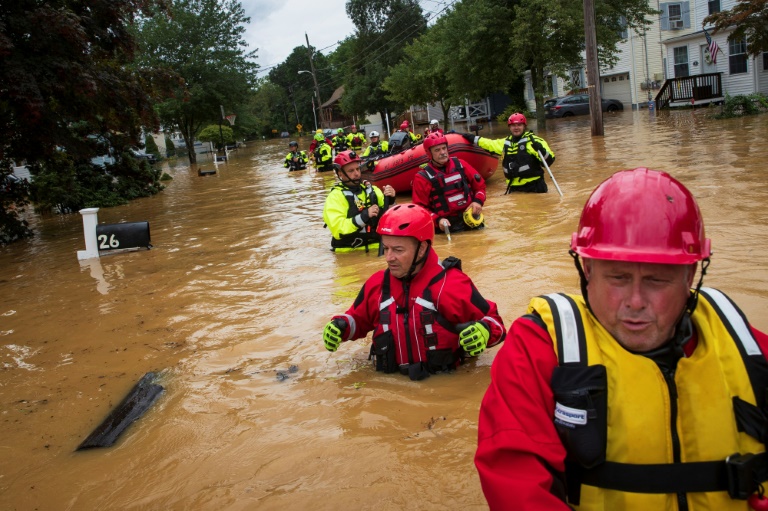Tropical Storm Henri slammed into Rhode Island on the US east coast Sunday, knocking out power to thousands of Americans, uprooting trees and bringing record rainfall before weakening as it moved across New England.
The storm — earlier downgraded from a Category 1 Hurricane — hit land near the town of Westerly at approximately 12:15 PM (1615 GMT), the National Weather Service said.
Henri is a rare tropical storm to strike America’s northeastern seaboard and comes as the surface layer of oceans warms due to climate change.
The warming is causing cyclones to become more powerful and carry more water, posing an increasing threat to the world’s coastal communities, scientists say.
Millions of residents in New England and New York’s Long Island had been told to prepare for violent winds, days without electricity and storm surges of up to five feet.
The US National Hurricane Center (NHC) said Henri brought maximum sustained gusts of 60 mph, lower than the 75 mph gusts predicted earlier.
Rhode Island Governor Dan McKee said there was “significant flooding” in areas. There were no immediate reports of any casualties.
By mid-afternoon the NHC had lifted all surge warnings and initial reports from residents indicated the storm was not as bad as projections feared although in Groton, Connecticut fallen trees threatened some homes.
“We dodged a bullet,” James Kiker, of Newport, Rhode Island, told AFP, saying he saw only “minimal damage” in his area, including a few broken branches.
Residents on Long Island, home to the plush Hamptons villages where wealthy New Yorkers retreat in summer, expressed relief that the storm’s path had skirted east of them.
“I will continue to stay alert as still plenty of wind, rain and surging seas await us but I am breathing a little easier,” Amy Pedatella, a 46-year-old property manager who spent Saturday securing seaside homes in the Hamptons, told AFP.
– Concert abandoned –
In Newark, New Jersey, flash flooding caused havoc with emergency services rescuing 86 people, including 16 children, from submerged vehicles.
In Helmetta, 30 miles south, volunteer firefighters waded through water waist deep to help evacuate residents from waterlines rising dangerously close to their homes.
Some 79,000 people lost power in Rhode Island and another 33,000 suffered blackouts in Connecticut, according to the tracking website poweroutage.us.
More than 200 flights were canceled at Newark airport while New York’s LaGuardia and JFK airports canceled almost 200 between them, they said.
President Joe Biden ordered the Federal Emergency Management Agency (FEMA), to coordinate disaster relief efforts in Rhode Island, Connecticut and New York, where Governor Andrew Cuomo deployed 500 National Guard soldiers.
“We’re doing everything we can now to help those states prepare, respond and recover,” he told reporters.
The NHC said in its 5:00 pm advisory that winds had reduced to 40 mph and “additional weakening” of the storm was expected as it scales down to a tropical depression during the evening.
Henri missed New York City by several miles but still caused tropical storm conditions overnight and throughout Sunday, where a flash flood warning was in effect until 5:45 pm.
– Sandy fears –
Rain late Saturday forced New York to halt a star-studded Central Park concert billed as a “homecoming” for a metropolis hard hit by the pandemic.
An announcer cut off pop legend Barry Manilow mid-song to urge revelers to proceed swiftly but calmly to the nearest exit.
The National Weather Service said 1.94 inches of rain fell in the park between 10:00 pm and 11:00 pm Saturday, the wettest hour on record in the city of eight million people.
By the time it blows out, Henri is expected to have produced three to six inches of rain (7.5 to 15 centimeters) across the region, with isolated maximum totals near 12 inches, the NHC said.
Before the downgrade, Henri was set to be the first hurricane to hit New England in 30 years. Hurricane Bob in 1991 killed at least 17 people.
The warnings also reignited memories of Hurricane Sandy, a more powerful storm that knocked out power for much of Manhattan and flooded subways in 2012.









